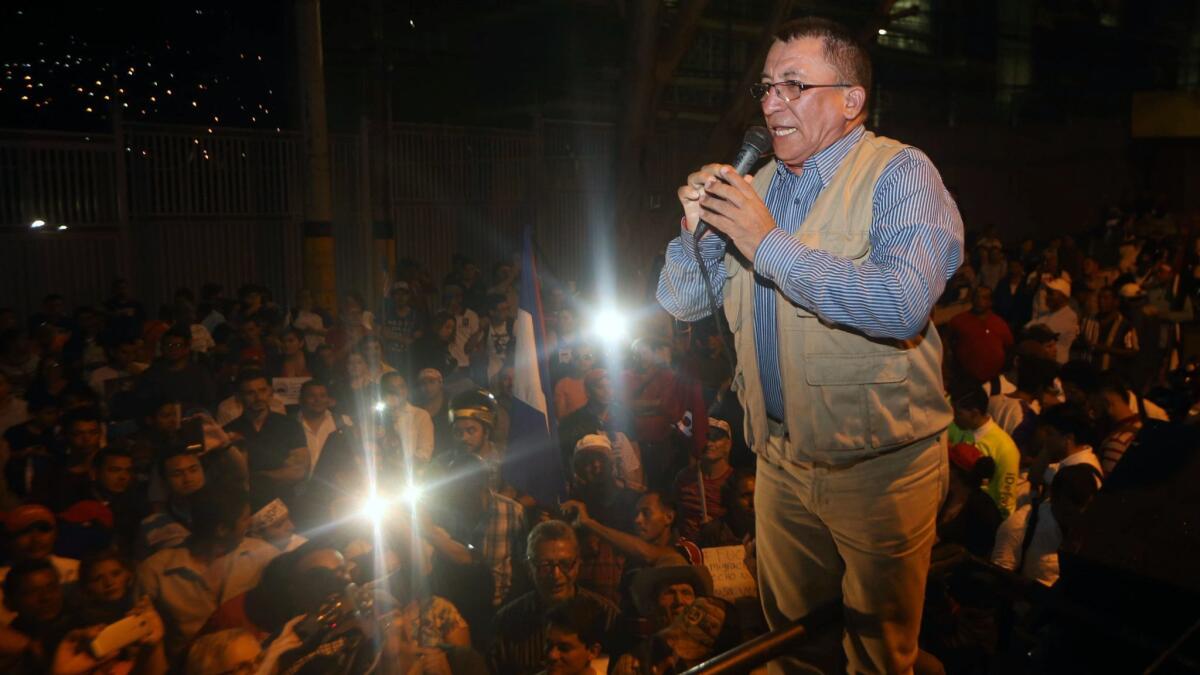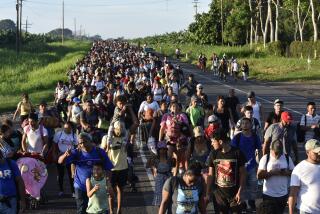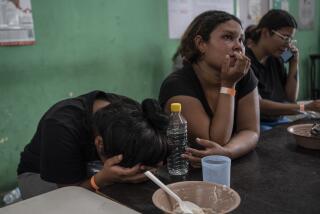‘The only one using this caravan in a political way is Donald Trump,’ organizer says

Reporting from Ciudad Hidalgo, mexico — Nearly three weeks ago, Honduran activist Bartolo Fuentes posted a flier on his Facebook page about a group of immigrants heading north for the United States. “We are going to accompany these people,” he said.
Fuentes, a former congressman who hosts a radio program about immigration, said he expected the group to number about 200 people. But soon his post was being shared hundreds of times over, and Fuentes was flooded with responses.
“I’m going to go,” one person wrote.
“I’m ready for the trip,” said another.
“Can one go with children?” somebody else asked. “I am interested.”
When local television outlets in Honduras decided to feature the growing caravan, thousands more Hondurans packed their bags and joined.
Today, as the caravan makes its way through southern Mexico, it numbers around 7,000 people and stretches for miles — a spectacle that has led to widespread conjecture about its origins.
President Trump has suggested that the caravan is being used as a cover for terrorists from the Middle East. Vice President Mike Pence said there are reports that Venezuela’s leftist government is funding the group.
Billionaire Democratic donor George Soros has been accused by figures on the right, and Russia has been accused by figures on the left, with both sides suggesting the timing might have something to do with the November midterm election.
But Fuentes insists it was none of those things.
“There are no institutions — religious, charity or political — that are financing this,” he said in a phone interview from Honduras, where he was deported after being detained by Guatemalan authorities. “The only ones using this caravan in a political way are the Americans and Donald Trump.”
His skeptics on that point include some powerful Honduran politicians, who have accused Fuentes — a member of the main leftist opposition party — of both funding the caravan and acting as a “coyote” who took money from the migrants to smuggle them north.
Mireya Aguero, the country’s minister of foreign affairs, suggested recently that Fuentes organized the caravan to make Honduras look bad.
“This irregular mobilization was promoted and organized by the same actors as in the past and has always generated destabilization and ungovernability in the country,” she said
Fuentes acknowledged that he has been an open critic of the Honduran government. But he pointed out that those marching in the caravan don’t belong only to the opposition party and aren’t interested in making political statements.
Ask caravan members why they left home, and the most common reasons are to escape poverty or violence, or to reunite with family members living in the United States.
But most say they learned about the caravan in the same place: social media.
One video — taken at the Honduras bus terminal where caravan members started out — was viewed nearly 300,000 times on Facebook.
When the caravan left Honduras, it had fewer than 2,000 people. But thousands more raced to join it as they saw coverage of the group traveling north.
Jecson Chicas, 22, said he decided to pack his bags when he saw another Facebook video that showed the caravan arriving in Guatemala. His parents and younger sister had both fled Honduras months earlier after several relatives were killed by gang members. His mother and sister had applied for political asylum in Mexico, while his father was seeking asylum in the United States.
The caravan seemed like a cheaper and safer option than traveling alone or with a smuggler, Chicas said, so he took a series of buses to catch up to it.
A few days ago, Chicas illegally crossed the Suchiate River from Guatemala into Mexico on a raft. His mother, Cruz Chicas Lopez, 40, was waiting on the other side, and they cried as they embraced.
“Mami, help me,” he said, handing her one of several pieces of luggage he was juggling. “I’m tired after traveling for so many days.”
“I know,” she said. “You need to rest.”
Chicas said he planned to go to the U.S. and seek asylum there.
Caravans have become popular in recent years because they allow migrants to share costs, and because many believe there is safety in numbers.
Earlier this year, another large migrant caravan from Honduras also angered Trump, who responded by sending National Guard troops to the U.S. border with Mexico.
Fuentes traveled part of the way with that group. When he learned earlier this month that several communities across the country were forging plans for another caravan, he said he offered to go with them.
He said enthusiasm grew when one newscaster mistakenly said some of the costs of the journey would be paid.
The journey in fact has been partly subsidized — by strangers along the way. Bus operators and even smugglers on the Suchiate river have offered discounts. In many towns, locals have organized to feed the migrants.
“Even really poor people have given them water, food and soda,” Fuentes said. “It’s been a really humane response.”
The caravan spent Tuesday night in Huixtla, Mexico, a small town 50 miles north of the border, and on Wednesday advanced to the town of Mapastepec.
But not everybody continued the journey north.
Christian Alvardo, 16, had hoped to reach relatives living in the Los Angeles area, and his 15-year-old cousin, Walter Mejia, had planned to join family in Boston.
They had heard about the caravan on the news and rushed to the bus station to get to the city of San Pedro Sula before it left.
But on Wednesday they sat defeated in the central plaza in Huixtla. After days on the road, having endured scorching sun and tropical downpours, they were among the scores of migrants who had given up.
The Honduran Embassy in Mexico was sending at least one bus to bring them home.
“It’s just too hard — the heat, the rain. It’s too much, “ Alvarado said. “But maybe I’ll try again sometime. It’s just too hard now.”
Linthicum reported from Mexico City and McDonnell from Ciudad Hidalgo.
Twitter: @katelinthicum
Twitter: @PmcdonnellLAT
Linthicum reported from Mexico City and McDonnell from Ciudad Hidalgo.
UPDATES:
5:54 p.m.: This article was updated with reporting from the Mexican city of Huixtla.
This article was originally published at 4:15 p.m.
More to Read
Sign up for Essential California
The most important California stories and recommendations in your inbox every morning.
You may occasionally receive promotional content from the Los Angeles Times.










